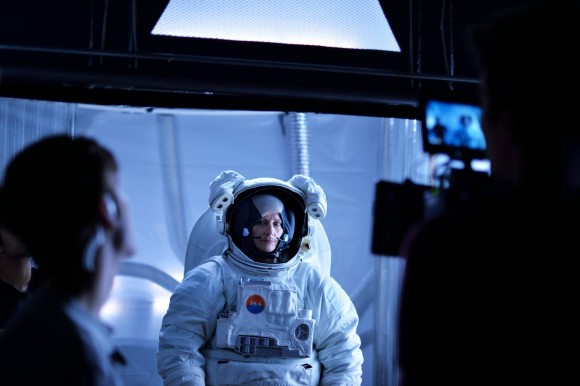Dodge Students Find Life on Mars with ICARUS
February 8, 2016
Space exploration may be challenging for some folks, but Dodge College students have already been to Mars.
Well, Red Rock Canyon State Park actually stood in for Mars, but it was still pretty close!
I recently spoke to the production team behind
Icarus
, an upcoming thesis film, to learn more about their project after seeing a pretty spectacular photo they posted on Instagram last semester of an astronaut exploring the Mars landscape.
“Our film is set on a Mars colony, which made finding the perfect location to act as Mars integral to the film’s success,” said Michelle Evans (BFA/Creative Producing ’16), producer of
Icarus
. “Our location manager, Connor Lambert (Creative Producing ’16), found a location 160 miles north of Dodge, and it was Red Rock Canyon State Park.”
Evans told me that the crew of 15 students spent the night before shooting camping at Red Rock, and woke up at sunrise the first day of principle photography to shoot VFX plates before their actor arrived later that morning. Based on some of the things I’ve seen from the film so far, I’d say that plan worked out well for them.

On location at Red Rock Canyon State Park
The film itself covers a single day in the life of Mars colonist Chris Riley. When the colony’s communications satellite is damaged, Emilia Riley, Chris’ mother, embarks on a seemingly harmless repair excursion. A shuttle malfunction cuts connectivity to the ground and Chris makes the knee jerk decision to go after her.
Icarus
is a story about a young man’s struggle to cope with failure and overcoming the death of a loved one, within the vacuum of outer space.
While the story may seem very ambitious, the crew behind
Icarus
is definitely talented enough to pull it off.
For example, that team includes director Tom Teller (BFA/Film Production ’16), who is a 2015 Student Academy Award Finalist, and cinematographer Nico Aguilar (BFA/Film Production ’16), who is a Kodak International Cinematography Student Scholarship Award winner and American Society of Cinematographers Heritage Award winner. Just to name a few.
“We aim to produce the most ambitious film in our school’s history by seamlessly integrating visual effects and live action,” said Evans.
Pre-production on the film began for Teller almost immediately after he wrapped on his AP film,
HUM
(which is currently making the rounds at film festivals, and doing quite well). Teller began crafting the story with writer Andrew Gustaferro (BA/Screenwriting ’16) to really nail down the script. During the summer of 2015, Teller and Evans began trying to figure out the logistics of the shoot, including locations, costuming, and production design details.
Their production schedule was pretty relaxed, despite the massive scope of the project. According to Evans, they did not shoot for the full 12 hours on days they allotted, having wrapped before then.

Shooting at Stage B
“We had a very small amount of locations and most of our work is being completed on sound stage B at Dodge,” said Evans. The production wrapped on November 1, and they had a rough cut of the film completed a week later, so their animators and digital effects team could get to work.
“
Icarus
has a great deal of VFX integration and one of the challenges was figuring out what needed to be shot live action and what to do in post-production,” said Evans. “Our entire third act takes place in outer space. Doing a film with this much VFX integration, on a budget smaller than $20,000 and having it all done in less than 6 months is something that has never been done before at Dodge, so convincing the faculty that this is possible and ensuring that we have a crew qualified to tackle such a massive project was a major challenge.”
However, it was a challenge they were up to, as it was the past accomplishments of the production team that lead to the project getting approved to begin with.
“Our entire key crew is the best of the best at Dodge, students who have gone above and beyond what is expected of them in their classes and on their previous projects,” said Evans. “Without them, this film would not be possible. Our key crew has the full support of the faculty and we all have terrific relationships with our faculty mentors. The transparency we have with them has done nothing but help us with problem solving.”
Icarus
is now in full post-production mode, but will screen in April. We look forward to checking out Mars colonist Chris Riley’s story then!


